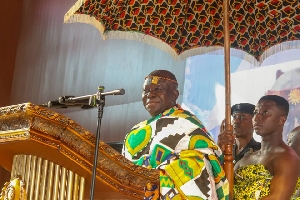Opinions of Monday, 14 September 2009
Columnist: Akosah-Sarpong, Kofi
The sacred fire of accountability
By Kofi Akosah-Sarpong
The Asantehene, Otumfuo Osei Tutu II, admonition to bureaucrats and politicians to be chary of accountability is a bravely ambitions suggestion. The unspoken wisdom through the Asantehene is that: traditional Ghana has recovered its confidence, its astuteness of goodwill, or anyway its gift for doing things right openly in Ghana’s progress. The Asantehene demonstrates that accountability is as traditional as it is modern for progress.
Certain parts of the Ghanaian/African tradition fuel corruption, as Jean-Francois Bayart explains in The State in Africa: The Politics of the Belly, where in an allegorical nepotistic, corrupt African state government officials, businessmen and businesswomen, elites, traditional linchpins and “Big Men,” sometimes with backing of juju-marabout spiritual mediums and other spiritualists, use their influence to “enrich themselves, their families or ethnic kinsmen.”
The Asantehene, as traditional leader and accountant, knows the destructive world of corruption in traditional and modern African setting that has asphyxiate many an African state’s progress. In Criminalisation of the State in Africa, Jean-Francois Bayart, Stephen Ellis and Beatrice Hibou argue that the growth of fraud and smuggling in African states, the marauding of natural resources, the privatization of state institutions, and the development of an economy of plunder make garbage of the state and the state itself becomes a vehicle for organized criminal activity.
Unaccountability set Sierra Leone, Rwanda, the Democratic Republic of Congo, Ivory Coast and Liberia on flames. It saw the angry Jerry Rawlings executing some military Big Men in Ghana; it saw Foday Sankoh amputating, maiming, raping and counting-looting Sierra Leone; it saw Liberia set on bonfire and President Samuel Doe killed like an armed robber with his ears cut off and paraded naked in public.
Unaccountability saw all sorts of despicable people emerge on the African scene and further destroying Africa. It saw “small boys” like Sierra Leone’s Valentine Strausser and Samuel Doe waving matches and playing on the volatile African political scene and setting it on fire. At the extreme end, Liberians, Sierra Leoneans, Kenyans, Congolese and Nigerians will sadly tell you terrible stories about unaccountability and how it has negated their progress despite their immense natural wealth.
The Asantehene’s idea is to make the case that accountability is as traditional as it is the soul of modern democratic practices and that tradition can help curb unaccountability. And the fact that how healthy a society is, is revealed in how accountable it is unto itself. The Asantehene’s traditional moral authority makes him a perfect person to speak on accountability, in a non-partisan position, throw light on a troubling development cancer, and thus the darkness that hover on unaccountability to recede a bit.
In African tradition, accountability, more called judgment (since one has to pay for one’s actions and face the consequences); the word as used by the Asantehene, has a metaphysical ring, too. In a complicated believe, Africans judge that what you are on earth is how accountability you were in your previous life – good, truthful, pure, balance life means your next life would be devoid of too much headaches. It lays more emphasis on the spiritual than the material, the source of corruption. Accountability, therefore, restrains one from extreme negative life on earth as fodder for good life in your next life.
The metaphysics aside, accountability, as an anti-dote to corrupt practices, hugely defines progress. The American economist John Kenneth Galbraith, said “Hard, visible circumstance defines reality.” The reality of the African accountability campaigns is that it hasn’t been addressed also from African culture, perhaps the key source of corruption.
In the past 52 years, public accountability, despite Rawlings’ executions, threats, exiling and blowing markets into pieces, has been slow. Operating in no-party, military juntas, with all democratic antecedents muzzled, the almost 20 years of Rawlings rule wasn’t openly accountable – for there was no democratic daylight into Rawlings’ conclave. Watchdog roles to track corruption were virtually nil. Anti-corruption institutions were either weak or none-existent compared to Nigeria that has set up the remarkable Economic and Financial Crimes Commission to tackle corruption. In the final analysis, Rawlings and his associates are better of materially today than they came to the Ghanaian political scene. In logic, in Rawlings’ accountability universe we see that, “moral concepts are lovely, but the key is governing these things by law,” as Elena Bonner, widow of Russian human rights campaigner Andrei Sakharov, said.
In Rawlings, who projects himself as chief-priest of anti-corruption, accountability campaigns do not work in authoritarian regimes but better under democracies as Ghanaians are experiencing today under their 17-year democratic dispensation and that has given the Asantehene the platform to speak out on accountability. In Rawlings, there are huge hypocrisy in the Ghanaian accountability world, with the boundary between conflict of interest and liability blurred. This makes public accountability weak and at the mercy of the powers-that-be instead of healthy public institutions to deal with it. In Nigeria, a group of high ranking military personnel, mostly during the Ibrahim Babangida and Sani Abacha juntas, demonstrate the networked nepotism characteristic of Bayart’s The Politics of the Belly by looting billions of dollars. In his four short years in power Abacha managed to embezzle over US$4 billion.
By talking about accountability, judgment and corruption, the Asantehene opens the floodgate for policy-makers to look also from the Ghanaian/African culture when addressing corruption.












